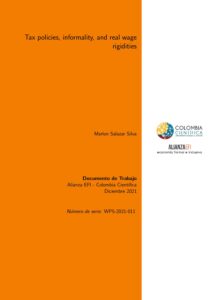Developing countries have a vast informal sector generally associated with low levels of productivity. The persistence of informality could be a response to rigidities in the labor market, associated with a combination of high non-wages cost and high minimum wages. This paper proposes a theoretical framework to understand the tax policies’ role that discourages informality, such as lower payroll taxes in the formal sector or increases enforcement expenditure in an economy with real wage rigidities. I develop a search and matching model with a shirking mechanism with formal and informal workers. The simulations results suggest that the magnitud effect of tax polcies depends on real wage rigidities. In relative terms, when the economy has high real wage rigidities, the reduction of payroll taxes has a greater effect reducing the informality. In contrast, when the economy has low real wage rigidities, the enforcement expenditure has a significant effect to reduce the informality. Also, the results show the existence of tax polcies combition that reduce the informal labor in an effective way
Autores:
- Marlon Salazar
Palabras clave:
- Efficiency wage
- Enforcement expenditure
- Fiscal policies
- Informality
- Search and matching
- Shirking mechanism
- Tax policies
Categorías:
- Proyecto 5
- Documentos de trabajo
